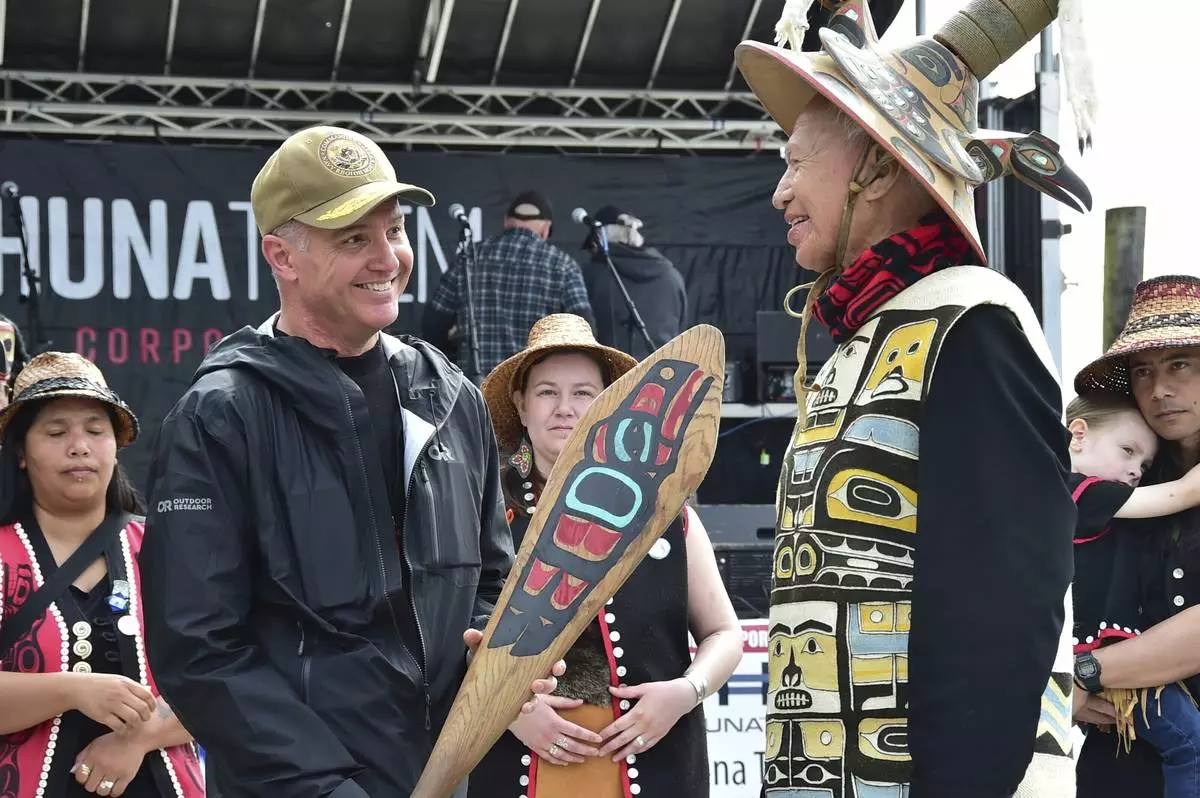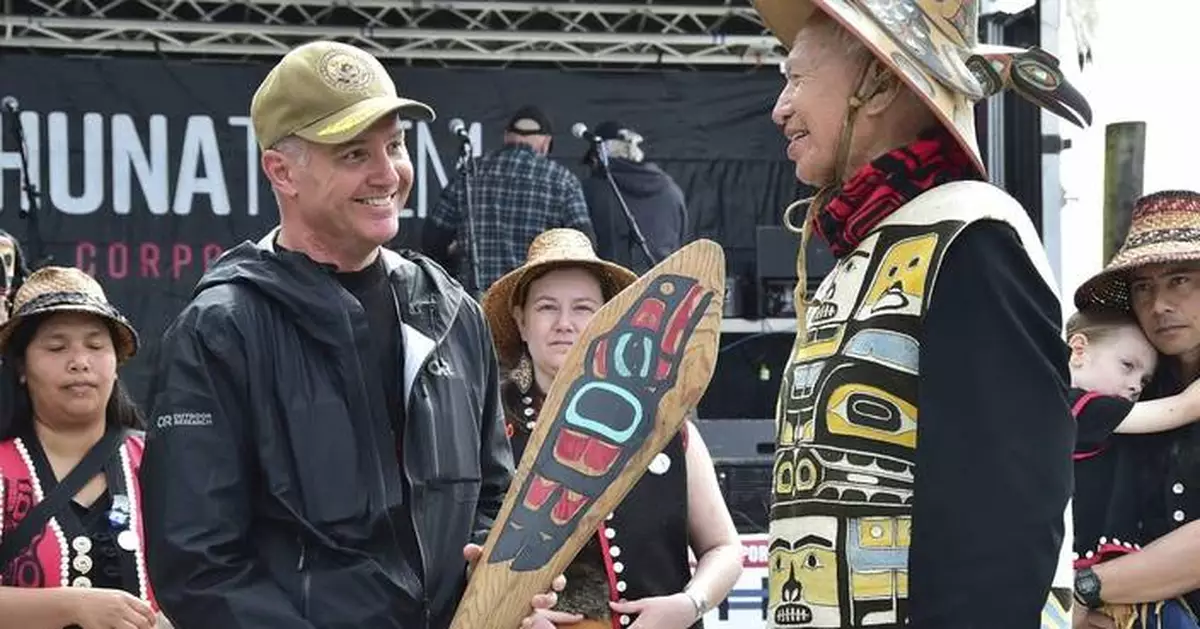ANCHORAGE, Alaska (AP) — Shells fell on the Alaska Native village as winter approached, and then sailors landed and burned what was left of homes, food caches and canoes. Conditions grew so dire in the following months that elders sacrificed their own lives to spare food for surviving children.
It was Oct. 26, 1882, in Angoon, a Tlingit village of about 420 people in the southeastern Alaska panhandle. Now, 142 years later, the perpetrator of the bombardment — the U.S. Navy —has apologized.
Rear Adm. Mark Sucato, the commander of the Navy's northwest region, issued the apology during an at-times emotional ceremony Saturday, the anniversary of the atrocity.
“The Navy recognizes the pain and suffering inflicted upon the Tlingit people, and we acknowledge these wrongful actions resulted in the loss of life, the loss of resources, the loss of culture, and created and inflicted intergenerational trauma on these clans,” he said during the ceremony, which was livestreamed from Angoon. “The Navy takes the significance of this action very, very seriously and knows an apology is long overdue.”
While the rebuilt Angoon received $90,000 in a settlement with the Department of Interior in 1973, village leaders have for decades sought an apology as well, beginning each yearly remembrance by asking three times, “Is there anyone here from the Navy to apologize?"
“You can imagine the generations of people that have died since 1882 that have wondered what had happened, why it happened, and wanted an apology of some sort, because in our minds, we didn’t do anything wrong,” said Daniel Johnson Jr., a tribal head in Angoon.
The attack was one of a series of conflicts between the American military and Alaska Natives in the years after the U.S. bought the territory from Russia in 1867. The U.S. Navy issued an apology last month for destroying the nearby village of Kake in 1869, and the Army has indicated that it plans to apologize for shelling Wrangell, also in southeast Alaska, that year, though no date has been set.
The Navy acknowledges the actions it undertook or ordered in Angoon and Kake caused deaths, a loss of resources and multigenerational trauma, Navy civilian spokesperson Julianne Leinenveber said in an email prior to the event.
“An apology is not only warranted, but long overdue,” she said.
Today, Angoon remains a quaint village of about 420 people, with colorful old homes and totem poles clustered on the west side of Admiralty Island, accessible by ferry or float plane, in the Tongass National Forest, the nation's largest. The residents are vastly outnumbered by brown bears, and the village in recent years has strived to foster its ecotourism industry. Bald eagles and humpback whales abound, and the salmon and halibut fishing is excellent.
Accounts vary as to what prompted its destruction, but they generally begin with the accidental death of a Tlingit shaman, Tith Klane. Klane was killed when a harpoon gun exploded on a whaling ship owned by his employer, the North West Trading Co.
The Navy's version says tribal members forced the vessel to shore, possibly took hostages and, in accordance with their customs, demanded 200 blankets in compensation.
The company declined to provide the blankets and ordered the Tlingits to return to work. Instead, in sorrow, they painted their faces with coal tar and tallow — something the company’s employees took as a precursor to an insurrection. The company’s superintendent then sought help from Naval Cmdr. E.C. Merriman, the top U.S. official in Alaska, saying a Tlingit uprising threatened the lives and property of white residents.
The Tlingit version contends the boat's crew, which included Tlingit members, likely remained with the vessel out of respect, planning to attend the funeral, and that no hostages were taken. Johnson said the tribe never would have demanded compensation so soon after the death.
Merriman arrived on Oct. 25 and insisted the tribe provide 400 blankets by noon the next day as punishment for disobedience. When the Tlingits turned over just 81, Merriman attacked, destroying 12 clan houses, smaller homes, canoes and the village’s food stores.
Six children died in the attack, and "there’s untold numbers of elderly and infants who died that winter of both cold, exposure and hunger,” Johnson said.
Billy Jones, Tith Klane’s nephew, was 13 when Angoon was destroyed. Around 1950, he recorded two interviews, and his account was later included in a booklet prepared for the 100th anniversary of the bombing in 1982.
“They left us homeless on the beach,” Jones said.
Rosita Worl, the president of Sealaska Heritage Institute in Juneau, described how some elders that winter “walked into the forest” — meaning they died, sacrificing themselves so the younger people would have more food.
Even though the Navy’s written history conflicts with the Tlingit oral tradition, the Navy defers to the tribe’s account “out of respect for the long-lasting impacts these tragic incidents had on the affected clans,” said Leinenveber, the Navy spokesperson.
Tlingit leaders were so stunned when Navy officials told them, during a Zoom call in May, that the apology would finally be forthcoming that no one spoke for five minutes, Johnson said.
Eunice James, of Juneau, a descendant of Tith Klane, said she hopes the apology helps her family and the entire community heal. She expects his presence at the ceremony.
“Not only his spirit will be there, but the spirit of many of our ancestors, because we’ve lost so many," she said.

In this photo provided by the U.S. Navy, Commander of Navy Region Northwest Rear Adm. Mark Sucato is gifted a canoe paddle by Leonard John, Raven Clan, Native Village of Angoon, following the One People Canoe Society's welcoming ceremony to kick off the annual Juneau Maritime Festival on May 4, 2024, in Juneau, Alaska. (Chief Mass Communication Spc. Gretchen Albrecht/U.S. Navy via AP)










